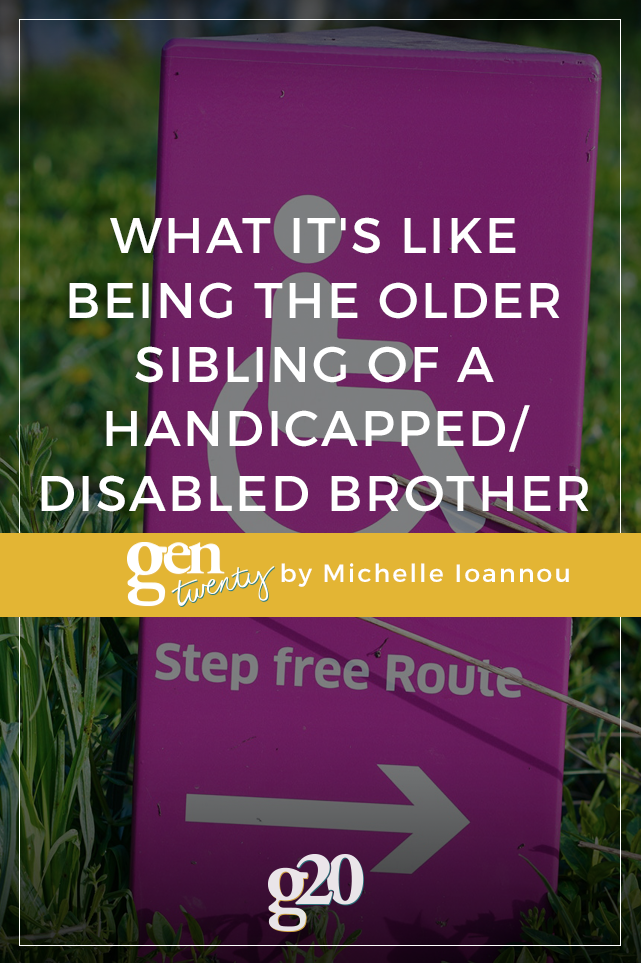
My brother was diagnosed with Duchenne Muscular Dystrophy when he was just four years old. I was only seven years old at the time, and as you can imagine, I did not fully understand what was going to happen to my little brother.
By the age of ten, my little brother was confined to a wheelchair.
Duchenne Muscular Dystrophy is defined as “a genetic disorder characterized by the progressive loss of muscle. It is a multi-systemic condition, affecting many parts of the body, which results in deterioration of the skeletal, heart, and lung muscles.” I have watched my brother become weaker and weaker. But, the details about all of this, is another article for another time.
For now, I want to speak to anyone who is the sibling of someone who is handicapped or disabled. It does change your life – in some ways for the worse, but in many ways, for the better. It’s hard, but beautiful at the same time. For those of you who are not in this position, you probably do not understand what I’m saying as it seems like a bunch of opposites. But for those of you who can relate to me, it is as though I can feel you nodding your head along.
What It’s Like Being The Older Sibling of a Handicapped/Disabled Brother
1. You learn you will never come first.
Your siblings’ health will always come first, as it should. Do you have a basketball game the same day as your sibling’s doctors appointments? You know where the priority is. A dance competition that is hours away? Your parents cannot leave your sibling for that long. And you understand it all, because that’s the way it is.
Of course sometimes there is resentment – we are all human and we cannot help it at times. But at all times you know that your parents (or other family members) are not doing this because they do not love you. It just unfortunately is how life is. You learn from a young age how to put others before yourself.
2. You learn what really is important in life.
Growing up, I was not as sensitive to certain things like some of my peers were. I did not cry over the boy who did not like me back. I did not cry over the pet that passed away. I did not stress over being in the popular crowd or not. Why? Because I had my brother at home, fighting for his life and fighting for strength, every day.
I saw firsthand what true stress and worry were. I knew from a young age that there were more important things to life and more important things that we should be focusing on.
3. You grow up faster.
I am very fortunate to have grown up with parents who made a valiant effort to ensure I had the best childhood that I could have under the circumstance. But still, I grew up much faster than many others my age.
In middle school I was missing out on lunch to go and help my brother walk around his classroom in an attempt to slow-down the progression of the disease. As a teenager, I was helping my brother reach things that he could no longer reach due to being confined to a wheelchair. By college, I was helping feed my brother.
To this day, I scratch his itches, blow his nose, move his arms/legs/etc for him – and much more. But it’s more than just the physical things – you grow up faster mentally as well. Your perspective on life changes.
[click_to_tweet tweet=”What It’s Like Being The Older Sibling of a Handicapped/Disabled Brother” quote=”What It’s Like Being The Older Sibling of a Handicapped/Disabled Brother”]
4. You become the ultimate protector.
You know the saying that no one can make fun of your sibling, but you? That rings so true for those of us with a disabled sibling. God help you if you look at my brother the wrong way, I won’t hesitate to say something. Or if you try to cut in front of my brother, or not let him first onto an elevator, or park in a handicap space when you do not have a sticker – I will say something to you.
This protectiveness does not go away, and sometimes shows up in other aspects of your life as well.
5. You are more attuned to accessibility awareness.
You find yourself looking at cars parked in handicap spots to see if they have a sticker or not. You immediately check to see if a restaurant you are at is accessible or not (and if they are not, you will say something). And you do not think twice about going up and saying hello to anyone who may be special needs or help them if they are alone. You become an advocate of disability awareness.
6. Things take a bit more planning.
You learn that you cannot simply run out to eat without checking to see if the restaurant is accessible first. You learn that you must check the weather the day before, to ensure it’s not raining too hard or snow is expected or it’s just too humid for your sibling’s breathing. Making plans takes an extra step, and doing things spur of the moment is much more difficult.
Of course, this is just a glimpse into what it is like to be the sibling of a handicap/disabled brother. And if you are the older sibling, you saw your little brother or sister grow up. You saw the disease progress, but you also saw many moments when your sibling beat the disease. Whether that moment was your sibling saying a full sentence for the first time in a while, a high school or college graduation, or a simple smile – those moments fill your heart with joy and remind you of what true strength and inspiration is.
